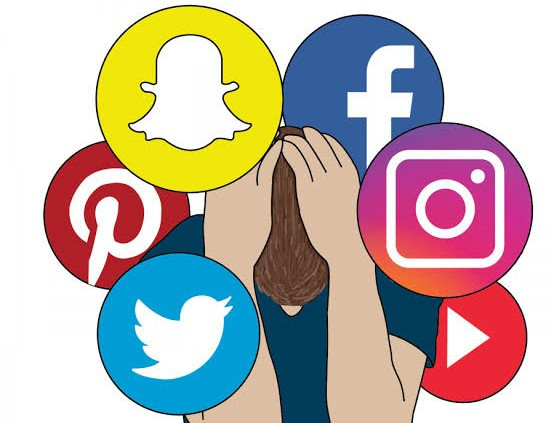Impact of Social Media on Mental Health

Human beings are social animals. We need to interact and connect with fellow human beings in order to thrive. While there has been a significant increase in the use of social media platforms over the last few years, it has emerged as a vital tool of communication, particularly during the pandemic. It gave a sense of assurance to those who were away from their loved ones and were stuck in distant parts of the globe due to lock down restrictions. People, especially youngsters, use social media platforms to stay in touch in with their friends and family members, to obtain information and most importantly, to share their political views and to voice their opinions on various issues.

However, excessive reliance on social media tends to make a significantly large number of people, susceptible to developing feelings of anxiety, hopelessness, depression, inadequacy and loneliness. In the era of digital surveillance, social media has virtually transcended the boundaries of all spheres of human life. At a time when experts and communities across the globe, are trying to normalize the entire discourse around mental health, it becomes extremely important to understand and analyse the impact of social media on the same. Overuse of social media platforms has been found to perpetuate various problems
- Social Media Leads to Erosion of Self Worth – Social media accounts of celebrities and influencers are often loaded with pictures that reinforce the myth of a ‘perfect life’ or a ‘perfect body’. Despite being aware of the fact that most of those seemingly perfect bikini pictures have been manipulated using editing softwares, consuming such content on a regular basis tends to make people feel inadequate about their own looks or bodies and about the way they think their lives are progressing. People usually share posts that highlight the happy moments of their lives. They rarely talk about their low points. This leads to feelings of envy and dissatisfaction.
- Social Media Exacerbates the Fear of Missing Out (FOMO) – Social media platforms such as Instagram and Facebook tend to present a distorted version of reality to the users. It amplifies the feelings of hopelessness and despair because people think that their friends and acquaintances are leading much more happening lives than them. It makes them feel like they are missing out on a lot in life. Hence, people develop an unhealthy obsession with social media. They start valuing social media interaction over actual, real world relationships.
- Social Media leads to Isolation and Loneliness – While it is commonly believed that social media platforms such as Facebook and Instagram have transformed the world into a close knit community, since the Internet does not recognize national borders and territorial demarcations, in reality, it has made people grow distant from each other. They have been trapped in a vicious cycle. Once they begin to feel that they are losing out in the rat race, they start using social media compulsively, in an attempt to seek validation from the number of likes and comments that they are able to gather. It is believed that receiving a large number of likes and comments causes the brain to release dopamine and react in the same manner as it does when a person consumes cocaine or nicotine. As a result, you find people constantly fixated to their smart phones. They tend to prioritize the virtual world over real time conversations with their well wishers, which makes them susceptible to various mood disorders such as anxiety and depression.
- It leads to Digital Addiction – One of the biggest advantages as well as disadvantages of social media is that it is easily accessible through smart phones and other digital devices such as tablets. While this hyper connectivity makes it ridiculously easy for people to access information at the drop of a hat, it tends to negatively impact their concentration and span of attention. The constant urge to check notifications leads to digital enslavement. Health experts are concerned about the obesity crisis in children that is often seen as an outcome of the sedentary urban lifestyle. As they say, ‘sitting is the new smoking’. Recent studies have shown that lack of physical activity causes problems that are as serious as the ones caused by smoking. Social media addiction simply adds to the crisis. Most people tend to use social media as a means for escaping the reality. The 2020 Netflix film, The Social Dilemma, rightly captures the essence of the problem. A famous dialogue from the film says, “If you are not paying for the product, you are the product.” This means that tech giants use social media algorithms as means to manipulate the users and encourage addiction. Social media platforms are inherently designed to captivate the attention of the users. That is how these companies make money.
- The Impact of Cyber Crimes on Mental Health – Cyber crimes refer to unlawful acts where a computer or a communication device is used to facilitate the commission of a crime. Recent surveys have indicated that almost 40% of social media users have been harassed online and 73% of them have witnessed someone else being harassed online. Online harassment includes Trolling, Hacking, Cyber Stalking, Defamation and Hate Speech, Public Shaming and several other offences. Cyber bullying affects people psychologically, physically and even socially. It leads to anxiety, depression and suicidal tendencies.

If you find yourself spending more time with your phone than with your friends and family members, if the constant urge to post content or respond to notifications makes it extremely hard for you to focus on studies or work, and to make time for other activities, if you have been unhealthily comparing yourself with other social media users and if you have been experiencing bouts of anger, anxiety and depression, you are probably suffering from social media addiction. In order to deal with this, you need to find ways to channelize your energy in the right manner. Reduction in screen time, developing a new hobby, learning a new skill, inculcating the habit of reading books and going for a social media detox, can help you get rid of the unhealthy obsession with social media.


